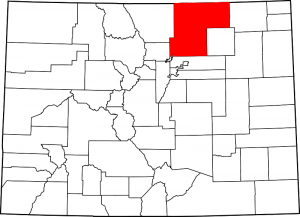SALEM, Ohio — An undercover animal rights investigator who spent four months producing a video documenting alleged abuse to cattle on a Colorado farm is herself being charged for animal cruelty.
Taylor Radig, an investigator for the animal rights organization Compassion Over Killing, is charged with a misdemeanor after the local sheriff’s office said she failed to report the abuse in a timely manner.
Her video documented alleged mishandling of dairy calves on Colorado’s Quanah Cattle Co., located in Weld County northeast of Denver. The video was turned over to law enforcement Nov. 12 and also resulted in animal cruelty charges against three of the farm’s workers.

Scot Hillman, chairman of the board for J.D. Heiskell & Co., which is a partner in the farm, said the farm “took immediate corrective action and terminated the three individuals seen in the video. We are now focused on re-training employees and taking care of our animals.”
The farm has engaged a third-party animal handling expert to do training for employees at the facility and has implemented an animal care code of conduct that all employees must read and sign prior to working.
Sat on video too long
As law enforcement continued their investigation, they discovered the video was produced between July and September, as much as four months before the abuse was revealed. That’s too long for Colorado state law, which requires prompt, timely action against animal abuse.
“They could have put an end to the cruelty back in July, but they didn’t so that’s why she got charged, because she allowed the mistreatment to continue,” said Weld County Sheriff John Cooke.
Had she turned in the report sooner, she would only have been treated as a witness, the sheriff said.
Questions the charge
According to Compassion over Killing, which was founded by Paul Shapiro — the senior director of Humane Society of the United States’ factory farming campaign, the charge against the investigator was unfounded.
“The charge against our investigator is unsupported by the law, and it reeks of political motivation fueled by an agribusiness industry that continues to lash out in desperation aiming to stop undercover investigators from exposing the truth,” according to the organization.
But Cooke refuted that claim, saying his duty is to enforce the law.
“That’s ridiculous,” he said. “Agriculture is important, but the sheriff’s office is not into agribusiness, we’re into the law enforcement business and that’s what we did, is enforce the law.”
The organization, known also as COK, filmed the alleged abuse at a time when many states are considering new legislation that would limit what visitors to farms can record, and the types of permission they will need.
Animal rights organizations, on the other hand, say they need the additional time, and right, to continue filming, in order to document enough evidence.
Concerning the most recent video, Cooke said there would have been enough evidence from July alone to make the animal cruelty charges, and more animals would have been spared.
“Just imagine the number of calves that have gone through that place in the past four months and the number they could have protected if they truly cared about the calves,” he said.
Warning: Video contains graphic content.











And Sheriff Weld announced he was running for State Senator in August.
Oh no…nothing political or grandstanding about this act at all.
miss the butterfly Shelly gotten your check this week for the HSUS?
The only grandstanding is being done by the AR groups who see no problem with allowing abuse to go on for months so their videos will coincide with the timing of bills they want introduced. A truly compassionate person would turn in evidence right away to make sure the animals being abused are protected ASAP. They get jobs on farms to do their taping and, in spite of most signing paperwork to turn abuse in to management right away, they don’t do that. Instead they allow it to continue for months, saying nothing to anyone. Their agenda is a vegan world, NOT humane care of animals. It’s about time they start getting charged for abuse when they withhold evidence.
I totally agree. Withholding that kind of evidence for that length of time is in and of itself CRUEL. It means more animals suffered than just the initial ones. :o(( disgusting. Maybe this will teach some of these A-R-ists that they need to tow a line too.
for sure Nancy if these people are so concerned about abuse why would they let it go on for MONTHS or even days without letting the police know.. why>?? because it is NOT about the animals.. it is about the $$$$$
In essence the videographer witheld evidence– against the law no matter the circumstances. . As Sheriff Cooke said there would have been enough evidence from July alone to make the animal cruelty charges, and more animals would have been spared. If it had been a farm worker who sat on four months of video evidence you can be sure that COK would be banging down Sheriff Cook’s door demanding similar charges be layed.
Nancy, ever heard of a thing called an “undercover investigation”?
Well, just like all other undercover investigations done by groups and journalists in the past, they conduct an investigation over time. This is the only way to determine if the problem is systematic and company wide, or only related to a few people.
Leslie, actually the investigator didn’t withhold the video. After all, the police wouldn’t know the problem existed if she didn’t step forward. No, the Sheriff is grandstanding. No my guess is he’s planning on sucking up to the CAFO owners and other big ag folks in his area, both for campaign contributions and political support in his campaign.
The thing is, these types of cases have already been argued in courts in the past, related to journalists going undercover and the police wanting their evidence or attempting to charge them for obstruction.
As for the Colorado statute, I’m amazed the local prosecutor hasn’t dumped the case. Not overly impressed with the law in that particular country.
but the person is NOT a journalist is she?/ just an HSUS or is it COK no matter they are one in the same lackey for the big boys who want to pass laws and do some factory fundraising while poor little whistle blower gets charged.. think they will bring int “big guns” to defend her?? bet not
Colorado is not a countrty
ok I am confused.. Paul Shapiro works for the HSUS and yet he calls this person “our investigator” so does she work of the HSUS or COK ( a hilarious name by the way) or they one in the same.. my guess is one in the same.. all of these terrorist groups are tied together at the hip
The problem is the abuse is systemic, not just isolated to a few “bad apple” employees. It is the result of the need to produce meat at the lowest cost possible. That is why animal cruelty laws are exempted for “generally accepted practices” in agriculture. In other words, you can be cruel to animals if that cruelty reflects an industry norm. We all know that farm animals today are routinely subjected to extreme confinement, mutiliation, and inhumane transport and slaughter due to highspeed kill lines that result in some animals regaining consciousness while being “processed”. The whole system needs to change – both the cruel industry practices and the laws that permit them.
and you know this how?/ I would bet you have never set foot on a kill floor..”we all know” does not extend to ALL
Anna, today’s food animal production system is considerably more humane and less stressful on the livestock and poultry than what you would find if you look into historic records and methods. Inhumane transport? Cattle used to be walked hundreds of miles to railheads, then shipped many more hundreds of miles to processors. From accounts I have read, Texas herds expected to loose 25% or more along the trail due to drought, exhaustion, inappropriate forage plants and injuries. Confinement? Well, it is 65 degrees in farrowing rooms today as the sows like it, but pads and lamps are used to created an 80 degree comfort zone for the piglets. You can’t do that in a pasture system. The pigs in the finishing buuilding are not piling up and crushing each other because their barn is about 70 degrees while it is 9 degrees outside. Also, they aren’t wading in muck deeper than their legs are long because we collect and manage manure these days. Of the pigs that are farrowed, better than 90% will go to market because they are cared for and properly medicated instead of left out side to fend for themselves in the weather and fight off diseases. When it is time to load them, it will take about a half hour to get 165 of them on a truck because they are in a barn equipped with gating and ramps designed to make pig movement a breeze. They may have even been presorted as they left the feeding station to reduce stress even more. This is a far cry from the days when people we drove hogs to market using dogs and horses, or chased them across open lots for a few hours using whips and prods to get 20 or 30 into a truck. Due to careful breeding improved housing and good care, those market hogs were finished with a lot less feed than the pigs of 50, 40 30 or even 10 years ago. That lowers the environmental impact of meat production. Surely you support efforts like that. I noticed that you worried about “mutilation.” Well, it isn’t like we are sending them to the local piercing shop and decorating them up like a teenage biker. When castration and tail docking isn’t a pleasant experience, of course. But that trauma and pain is similar to what you probably experience as a child when you got a cut or scrape. When that happened, you mother didn’t dose you with anesthesia, did she? Why? Because anesthesia side effects are often more severe than the cut itself.
Production of poultry, beef, sheep, and dairy has seen similar advances. Those advances have been devised by scientific method with emphasis place on what is best for the animal as it progresses toward fulfilling it destiny of becoming food for people.
I know you will probably have trouble accepting what I tell you. To help you along that journey, I encourage you to get closer to your food source. Find a farmer and ask to tag along for a day. Get involved in the work. See what it really takes to put food on the plates of millions of people each day. If you do, I think you will find that modern production methods are not the cruel and crimianal acts that you think them to be.